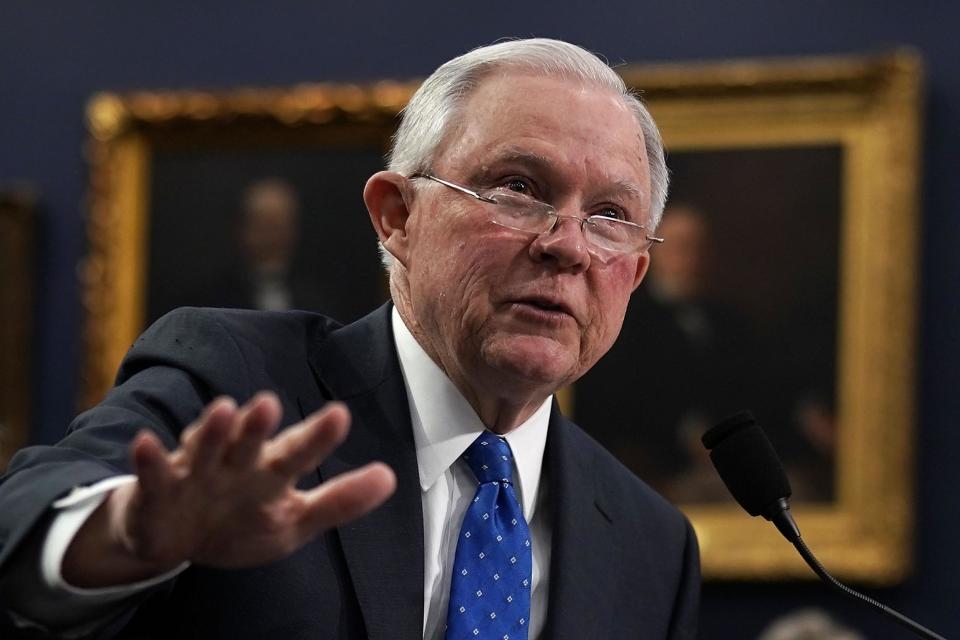Trump administration removes language on freedom of the press from Justice Department handbook

The Trump administration has removed language about freedom of the press from its guidebook for US attorneys.
The US Attorneys' Manual is a guide to Justice Department policies written for US attorneys and other department employees. It was edited late last year, for the first time in two decades, with significant changes to the “Media Relations” section – changes experts say reflect a larger Trump administration hostility towards members of the press.
Gone from the handbook is a section specifically reminding attorneys of the public's right to know. Gone is a section on the need for free press and public trial. Added to the manual is a section reminding employees to report any concerns to their superiors, and requiring them to disclose any contacts they have with the media.
Summer Lopez, the Senior Director of Free Expression Programmes at PEN America, said the changes showed a "deliberate effort to shift the tone of internal debates away from press freedom concerns".
"It confirms what we already know: That this administration is dismissive of the important work done by the press to promote government accountability," she said in a statement to The Independent.
Deputy Attorney General Rod Rosenstein ordered a review of the handbook last year, department spokesperson Ian Prior told BuzzFeed News, who first reported the changes.
The purpose of the overhaul – the largest since 1997 – was to “identify redundant sections and language, areas that required greater clarity, and any content that needed to be added to help Department attorneys perform core prosecutorial functions,” Mr Prior said.
The new manual removes a section titled “Interests Must Be Balanced,” which reminded attorneys to balance the public's right to information with an individual's right to a fair trial and the government’s ability to enforce justice.
Instead, it adds language on "the right of the public to have access to information about the Department of Justice" to a sentence in the opening section.
Also gone is a section on the need for free press and public trial, which previously stated that employees should consider “the right of the people in a constitutional democracy to have access to information about the conduct of law enforcement officers, prosecutors and courts, consistent with the individual rights of the accused”.
Added to the manual is a section on “whistleblower protections,” which reminds DOJ employees that they can report concerns to their management or the inspector general without threat of retaliation.
Another new section, “reporting media contacts” tells employees they must report any contact with members of the media about DOJ matters to their designated media representative.
Previous language in the handbook did not make such a stipulation. Instead, it said the department’s Office of Public Affairs should be informed of requests from national media organisations to discuss “in-depth stories and matters affecting the Department of Justice, or matters of national significance”.
Alexandra Ellerbeck, the North America Program Coordinator for the Committee to Protect Journalists, said the handbook changes were largely symbolic, and more of an indication of the department's priorities than a guide to how attorneys will behave on the ground.
But taken in the context of current Justice Department leadership and the administration as a whole, she said, the changes are concerning.
President Donald Trump has made his disdain for the mainstream press clear, at one point referring to them “the enemy of the American people”. He has suggested challenging the licenses of television networks that run negative coverage of him, and threatened to make people who leak information to the media “pay a big price”.
The head of the Department of Justice, Attorney General Jeff Sessions, has made similar statements. Last year, he told reporters his department had tripled the number of leak investigations over the previous administration, and even created a new counterintelligence unit in the FBI to work on the issue.
Mr Sessions also said he would review current rules that make it difficult to subpoena reporters for the names of their sources.
Ms Ellerbeck said these comments made her nervous about the edits to the handbook.
“This administration has shown an unprecedented level of overt hostility to the press, and in that context I think these changes are concerning,” she told The Independent. “...They’re another example and another indication of where the administration's priorities are when it comes to a free press.”
Video: Trump Blasts Justice Department During Televised Interview
Watch news, TV and more on Yahoo View.

